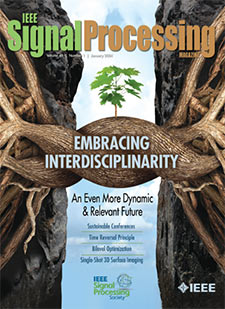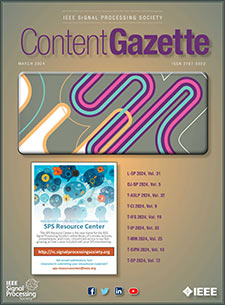- Our Story
- Publications & Resources
- Publications & Resources
- Publications
- IEEE Signal Processing Magazine
- IEEE Journal of Selected Topics in Signal Processing
- IEEE Signal Processing Letters
- IEEE/ACM Transactions on Audio Speech and Language Processing
- IEEE Transactions on Computational Imaging
- IEEE Transactions on Image Processing
- IEEE Transactions on Information Forensics and Security
- IEEE Transactions on Multimedia
- IEEE Transactions on Signal and Information Processing over Networks
- IEEE Transactions on Signal Processing
- IEEE TCI
- IEEE TSIPN
- Data & Challenges
- Submit Manuscript
- Guidelines
- Information for Authors
- Special Issue Deadlines
- Overview Articles
- Top Accessed Articles
- SPS Newsletter
- SigPort
- SPS Resource Center
- Publications Feedback
- Publications FAQ
- Blog
- News
- Dataset Papers
- Conferences & Events
- Community & Involvement
- Professional Development
- For Volunteers
- Information for Authors-OJSP
-
Home
Conferences Events IEEE JSTSP Article IEEE Signal Processing Magazine IEEE TIFS Article IEEE TMM Article IEEE TSP Article Jobs in Signal Processing Lectures Machine Learning Seasonal Schools Signal Processing News SPM Article SPS Distinguished Lectures SPS Newsletter Article SPS Webinar SPS Webinars SPS Webinar Series Webinar webinars
-
Our Story
What is Signal Processing?

The technology we use, and even rely on, in our everyday lives –computers, radios, video, cell phones – is enabled by signal processing. Learn More » -
Publications & Resources
-
SPS Resources
- Signal Processing Magazine The premier publication of the society.
- SPS Newsletter Monthly updates in Signal Processing
- SPS Resource Center Online library of tutorials, lectures, and presentations.
- SigPort Online repository for reports, papers, and more.
- SPS Feed The latest news, events, and more from the world of Signal Processing.
-
SPS Resources
-
Conferences & Events
-
Community & Involvement
-
Membership
- Join SPS The IEEE Signal Processing Magazine, Conference, Discounts, Awards, Collaborations, and more!
- Chapter Locator Find your local chapter and connect with fellow industry professionals, academics and students
- Women in Signal Processing Networking and engagement opportunities for women across signal processing disciplines
- Students Scholarships, conference discounts, travel grants, SP Cup, VIP Cup, 5-MICC
- Young Professionals Career development opportunities, networking
- Get Involved
-
Technical Committees
- Applied Signal Processing Systems
- Audio and Acoustic Signal Processing
- Bio Imaging and Signal Processing
- Computational Imaging
- Image Video and Multidimensional Signal Processing
- Information Forensics and Security
- Machine Learning for Signal Processing
- Multimedia Signal Processing
- Sensor Array and Multichannel
- Signal Processing for Communication and Networking
- Signal Processing Theory and Methods
- Speech and Language Processing
- Technical Working Groups
- More TC Resources
-
Membership
-
Professional Development
-
Professional Development
- Mentoring Experiences for Underrepresented Young Researchers (ME-UYR)
- Micro Mentoring Experience Program (MiME)
- Distinguished Lecturer Program
- Distinguished Lecturers
- Distinguished Lecturer Nominations
- Past Lecturers
- Distinguished Industry Speaker Program
- Distinguished Industry Speakers
- Distinguished Industry Speaker Nominations
- Industry Resources
- IEEE Training Materials
- Jobs in Signal Processing: IEEE Job Site
-
Career Resources
- SPS Education Program Educational content in signal processing and related fields.
- Distinguished Lecturer Program Chapters have access to educators and authors in the fields of Signal Processing
- PROGRESS Initiative Promoting diversity in the field of signal processing.
- Job Opportunities Signal Processing and Technical Committee specific job opportunities
- Job Submission Form Employers may submit opportunities in the area of Signal Processing.
-
Professional Development
-
For Volunteers
-
For Board & Committee Members
- Board Agenda/Minutes* Agendas, minutes and supporting documentation for Board and Committee Members
- SPS Directory* Directory of volunteers, society and division directory for Board and Committee Members.
- Membership Development Reports* Insight into the Society’s month-over-month and year-over-year growths and declines for Board and Committee Members
-
For Board & Committee Members
Popular Pages
Today's:
- Submit a Manuscript
- Information for Authors
- (MLSP 2024) 2024 IEEE International Workshop on Machine Learning for Signal Processing
- IEEE Transactions on Information Forensics and Security
- Signal Processing 101
- IEEE Signal Processing Letters
- IEEE Transactions on Image Processing
- IEEE Transactions on Multimedia
- Conferences & Events
- SPS SLTC/AASP TC Webinar: End-to-End Automatic Speech Recognition
- IEEE Transactions on Signal Processing
- (SLT 2024) 2024 IEEE Spoken Language Technology Workshop
- IEEE Journal of Selected Topics in Signal Processing
- IEEE/ACM Transactions on Audio Speech and Language Processing
- Conference Call for Papers
All time:
- Information for Authors
- Submit a Manuscript
- IEEE Transactions on Image Processing
- 404 Page
- IEEE/ACM Transactions on Audio Speech and Language Processing
- IEEE Transactions on Information Forensics and Security
- IEEE Transactions on Multimedia
- IEEE Signal Processing Letters
- IEEE Transactions on Signal Processing
- Conferences & Events
- IEEE Journal of Selected Topics in Signal Processing
- Information for Authors-SPL
- Conference Call for Papers
- Signal Processing 101
- IEEE Signal Processing Magazine
Last viewed:
- Test Form Responses
- IEEE Journal of Selected Topics in Signal Processing
- EDICS
- Information for Authors-SPL
- (SAM 2024) 2024 IEEE 13th Sensor Array and Multichannel Signal Processing Workshop
- SPS SLTC/AASP TC Webinar: End-to-End Automatic Speech Recognition
- Information for Authors
- Award Recipients
- IEEE Transactions on Multimedia
- Governance Documents
- Signal Processing Cup
- Call for Nominations: IEEE Medals & Recognitions
- Distinguished Lecturers
- (PCS 2024) 2024 Picture Coding Symposium
- (ISSPIT 2019) 2019 IEEE International Symposium on Signal Processing and Information Technology
Interview with Professor Shiv Dutt Joshi
You are here
Newsletter Menu
Newsletter Categories
Top Reasons to Join SPS Today!
1. IEEE Signal Processing Magazine
2. Signal Processing Digital Library*
3. Inside Signal Processing Newsletter
4. SPS Resource Center
5. Career advancement & recognition
6. Discounts on conferences and publications
7. Professional networking
8. Communities for students, young professionals, and women
9. Volunteer opportunities
10. Coming soon! PDH/CEU credits
Click here to learn more.
News and Resources for Members of the IEEE Signal Processing Society
Interview with Professor Shiv Dutt Joshi
Interview with Shiv Dutt Joshi, Professor, IIT Delhi, India
 Shiv Dutt Joshi received the B.E. degree (Hons.) in electrical and electronics engineering from the Birla Institute of Technology, Pilani, India, in 1981, and the M.Tech. degree in communications and radar engineering and the Ph.D. degree in signal processing from IIT Delhi, New Delhi, India, in 1983 and 1988, respectively. He is currently a Professor with the Electrical Engineering Department, IIT Delhi.
Shiv Dutt Joshi received the B.E. degree (Hons.) in electrical and electronics engineering from the Birla Institute of Technology, Pilani, India, in 1981, and the M.Tech. degree in communications and radar engineering and the Ph.D. degree in signal processing from IIT Delhi, New Delhi, India, in 1983 and 1988, respectively. He is currently a Professor with the Electrical Engineering Department, IIT Delhi.
His research interests include the development of fast algorithms for stochastic signal processing, speech processing, modeling of stochastic processes, and group theoretical approach to signal processing.
Q. Please tell us about your recent work in the area of signal processing.
Response: From the beginning, the focus of my research has been on optimum signal representation/processing. Although my research students have contributed on a variety of topics, I would like to mention three of them due to my personal interest. The first research thread, to which a number of my research students contributed, is a culmination to the concept of Signal matched Filter-banks. A multi-rate filter-bank is composed of two parts: one is the analysis side of the filter-bank and the other is called synthesis side of the filter-bank. Whenever one talks about a multi-rate filter-bank, it invariably implies a Perfect Reconstruction Filter-Bank (PRFB) where the output signal is a delayed version of the input signal. Here, we have proposed a Signal matched analysis Filter-bank, which is nothing but a single-input multiple-output whitening filter.
The idea behind the synthesis side was that when we are dealing with a particular signal or a particular class of signals, why we should reconstruct every signal under the sky. In fact, our focus should be on reconstruction of only the given signal or the given class of signals. This led to the concept of Signal matched Synthesis Filter-bank. Combining the two, we obtain the Signal Matched Filter bank. The second work is about Fourier Decomposition Method (FDM). General understanding in the literature is that Fourier based methods are not suitable for processing non-stationary signals. We found that it is not so. In this work, we have proposed a Fourier-based method, termed as FDM, for decomposing non-stationary signals which can be effectively used for time-frequency analysis of such signals. The last but not the least is the work of one of my Ph.D. students who proposed the notion of Functorial Signal representation and base-structured categories. I am specifically mentioning this work as this has set the tone for my future theoretical research which for some time got stuck in group theory (global invariance) rather than local invariance (Category/Groupoid perspective).
Q. Would you please share any of your impactful work with us?
Response: Some of our (myself along-with my research students) contributions, that I would like to highlight (as mentioned earlier though my research students have contributed in a variety of topics this list is biased towards my personal intrinsic interests) are as follows: 1) the work on FDM, which can be used for time-frequency analysis of non-stationary signals; 2) the notion of Signal matched Filter bank (SMFB) and associated fast algorithm for filtering and modeling. FDM and most of the other time-frequency analysis methods are block processed. This implies that one has to take block of data (frame) and perform the analysis, a variant form of SMFB, termed by us as Analytic Signal matched filet bank, can be used to perform truly adaptive time-frequency analysi; and 3) The third work is about base-structured categories for signal representation, which in my personal opinion, would go a long way.
Q. Do you think there are some learnings for us from COVID-19 pandemic with regards to engineering education, particularly, signal processing education?
Response: COVID-19 experience is going to change the world forever as never before. As and when the so-called normalcy returns, it would be a new normal. Whether we like it or not, we will have to learn to live with this new normal. As far education is concerned, people like me who have special liking for chalk and board type of teaching, contrasted with power-point presentation and involving other modern gadgets, would be worst affected. But any change brings with it new challenges and opportunities. In my opinion, augmented reality based algorithms and platforms would play a pivotal role in making the online class experience as good as real class-room experience in times to come.
Q. In your opinion, what are some of the most exciting areas of research in signal processing for students and upcoming researchers?
Response: I have been working in the area of signal processing for about four decades now but still feel that I know very little. Although there are many interesting areas of research related to signal processing, with my limited knowledge, experience and understanding, I would like to mention some of them. Needless to say my personal bias is clearly visible in the choice of topics. There are two fronts on which future Signal Processing research would be focused. One on the theoretical side and other related to applications. On the theoretical side I would like to mention at least three areas that I find exciting (needless to say my bias is clearly visible).
First: Most practical signals are not 1-D. Whether it is Geophysical Signals of biomedical signals such as EEG, or Audio etc. Most of the time we process such signals treating them multi-variate signals. The signals which are actually distributed in time and space should be handled in that way only. In my personal opinion, Graph Signal processing, by incorporating suitable flexibility, can provide the right framework to model spatio-temporal dynamics. Second area that I find interesting is optimum sampling. The Nyquist sampling/reconstruction is confined to Linear and Time-Invariant processing (operators) only. By expanding the scope of processing to non-linear and/or time varying domains, it would be interesting to investigate as to how much samples can be traded with complexity of processing. Needless to say, the intrinsic invariances of the underlying phenomenon being modeled would play a key role.
The last but not the least is the Functorial Signal representation. Most signal modeling approaches use some algebraic/topological structure of the signal space. Modeling it as base-structured category, proposed by one of my students, in my opinion would be a very interesting direction to explore as is does away with that constraint and be effectively used to model local invariances. Processing of Geophysical and Bio-medical signals/images (X-Ray, MRI, EEG, ECG, fMRI, Ultra-sound etc.) are a very rich application areas for researchers working in Signal processing with its own typicality. Processing of such signals can provide new application as well as theoretical challenges.
Open Calls
Society News
Education & Resources
- Next Upcoming SPS Webinar Series: Signal Processing And Computational imagE formation (SPACE)
- Upcoming SPS Webinar Series: Signal Processing and Computational Image Formation (SPACE)
- Upcoming Webinar: "Distributed Localization and Tracking of Mobile Networks"
- Towards Virtual Classroom Technologies: Challenges and Opportunities
Publications News
Member Highlights
TC News
Chapter & DL News
Initiatives & Trends
Editorial
SPS on Twitter
- DEADLINE EXTENDED: The 2023 IEEE International Workshop on Machine Learning for Signal Processing is now accepting… https://t.co/NLH2u19a3y
- ONE MONTH OUT! We are celebrating the inaugural SPS Day on 2 June, honoring the date the Society was established in… https://t.co/V6Z3wKGK1O
- The new SPS Scholarship Program welcomes applications from students interested in pursuing signal processing educat… https://t.co/0aYPMDSWDj
- CALL FOR PAPERS: The IEEE Journal of Selected Topics in Signal Processing is now seeking submissions for a Special… https://t.co/NPCGrSjQbh
- Test your knowledge of signal processing history with our April trivia! Our 75th anniversary celebration continues:… https://t.co/4xal7voFER
Home | Sitemap | Contact | Accessibility | Nondiscrimination Policy | IEEE Ethics Reporting | IEEE Privacy Policy | Terms | Feedback
© Copyright 2024 IEEE – All rights reserved. Use of this website signifies your agreement to the IEEE Terms and Conditions.
A not-for-profit organization, IEEE is the world's largest technical professional organization dedicated to advancing technology for the benefit of humanity.









